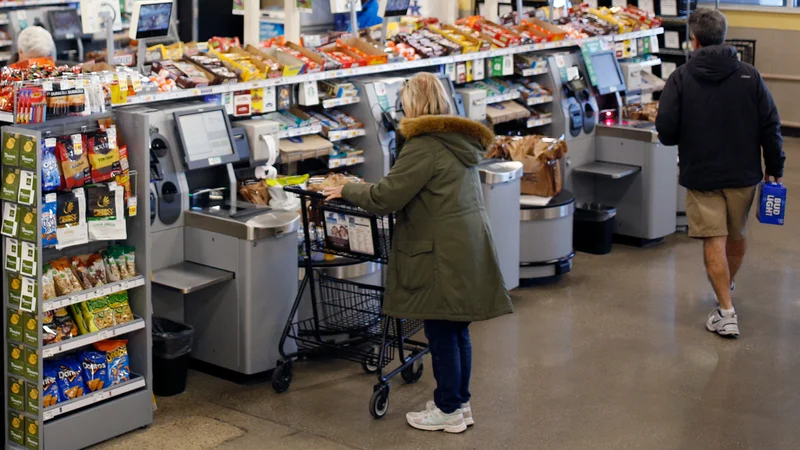Real-Time BNB Signal Analytics
Real-Time BNB Signal Analytics
The recent tentative agreement between the United Food and Commercial Workers (UFCW) union and grocery giants Kroger and Albertsons in Southern California has been framed as a landmark defense of the human cashier. On the surface, headlines about the new California Kroger, Albertsons contracts include new pension plan, self-checkout rules celebrate new rules designed to curb the relentless march of the self-checkout machine.
But reading the press releases and the online chatter is like analyzing a company's glossy annual report. The real story isn't in the mission statement; it's buried in the financial footnotes. When you strip away the narrative and look at the raw numbers of the deal, a different picture emerges. This wasn't a Luddite rebellion against automation. It was a cold, calculated transaction over long-term financial liabilities.
The public-facing components of this agreement are all about the checkout lane. At least one full-service, human-staffed lane must remain open from 8 a.m. to 7 p.m. A dedicated employee must monitor each bank of self-service terminals. And new signage will limit self-checkout to "about 15 items" (a deliberately ambiguous term that’s more of a suggestion than a hard rule).
These are tactical, observable changes designed to generate goodwill. They address a common customer frustration and provide a visible "win" for the union. They are, in essence, the optics of the deal.
The anecdotal data from online forums reflects a complete misreading of this strategy. I see comments from users in Chicago calling the new rules "stupidity," while others from Seattle draw a direct, and I think overly simplistic, line from minimum wage hikes to job losses. This sentiment pattern suggests a fundamental misunderstanding of the negotiation. The fight wasn't about whether self-checkout should exist; it was about the price of its existence.
What do these rules actually cost the company? Marginally more than the current system. Reassigning an employee to a self-checkout bay isn't creating a new position so much as reallocating an existing one. Mandating one open checkout lane during peak hours is an operational tweak, not a structural overhaul. It’s a low-cost concession. The real negotiation, the one with compounding financial consequences, was happening somewhere else entirely.
Let’s look past the checkout counter and into the ledger. The agreement stipulates hourly wage increases between $3.50 and $4.95 by 2027. For a full-time employee, that’s a raise of over $7,000 a year—to be more exact, between $7,280 and $10,296 annually before overtime. This is a significant, material improvement in direct compensation for more than 45,000 workers.

But the real story, the one that affects corporate balance sheets for decades, is in the pension funds.
The agreement doesn’t just increase pension funding; it creates an entirely new supplemental pension plan. Starting in March 2026, the retailers will contribute 25 cents per hour, for all hours worked, into this new fund. This is on top of the $2.85 per hour they will continue to contribute to the existing plan. The total pension contribution will be over $3.00 an hour—more precisely, $3.10 when the new plan kicks in.
And this is the part of the agreement I find genuinely telling. The language around self-checkout is soft, using phrases like "about 15 items." The language around pension contributions is hard-coded: 25 cents per hour, for all hours worked, starting on a specific date. One is a guideline; the other is a contractual, legally binding financial obligation. That tells you where the real negotiation happened.
This is the engine of the deal, hidden under the hood. The self-checkout rules are the flashy chrome bumper—it's what everyone sees and talks about. But the long-term, compounding value for the union and its members is in the guaranteed, multi-decade funding of their retirement. For the companies, it’s a massive, predictable, and permanent increase in their labor costs. Why would they agree to that? What did they get in return?
They got certainty. They effectively bought labor peace and a managed, predictable framework for continuing their automation strategy. They traded a few operational headaches at the front of the store for a clear financial path forward. This wasn't a defeat for automation; it was the formal pricing of its social and labor impact.
This deal should not be mistaken for a victory against technology. It is a textbook case of a union successfully negotiating the terms of technological adoption. The UFCW didn't stop the spread of self-checkout; it simply put a price tag on it. The union essentially told Kroger and Albertsons: "You can have your machines, but in exchange, you will provide long-term, enhanced financial security for the humans who still work here."
The companies get to continue pursuing efficiency gains, and the union gets a significant, quantifiable improvement in wages and retirement benefits that will compound for years to come. This is a pragmatic compromise dressed up as a moral crusade. The real story isn't about saving the cashier; it's about properly funding their pension.